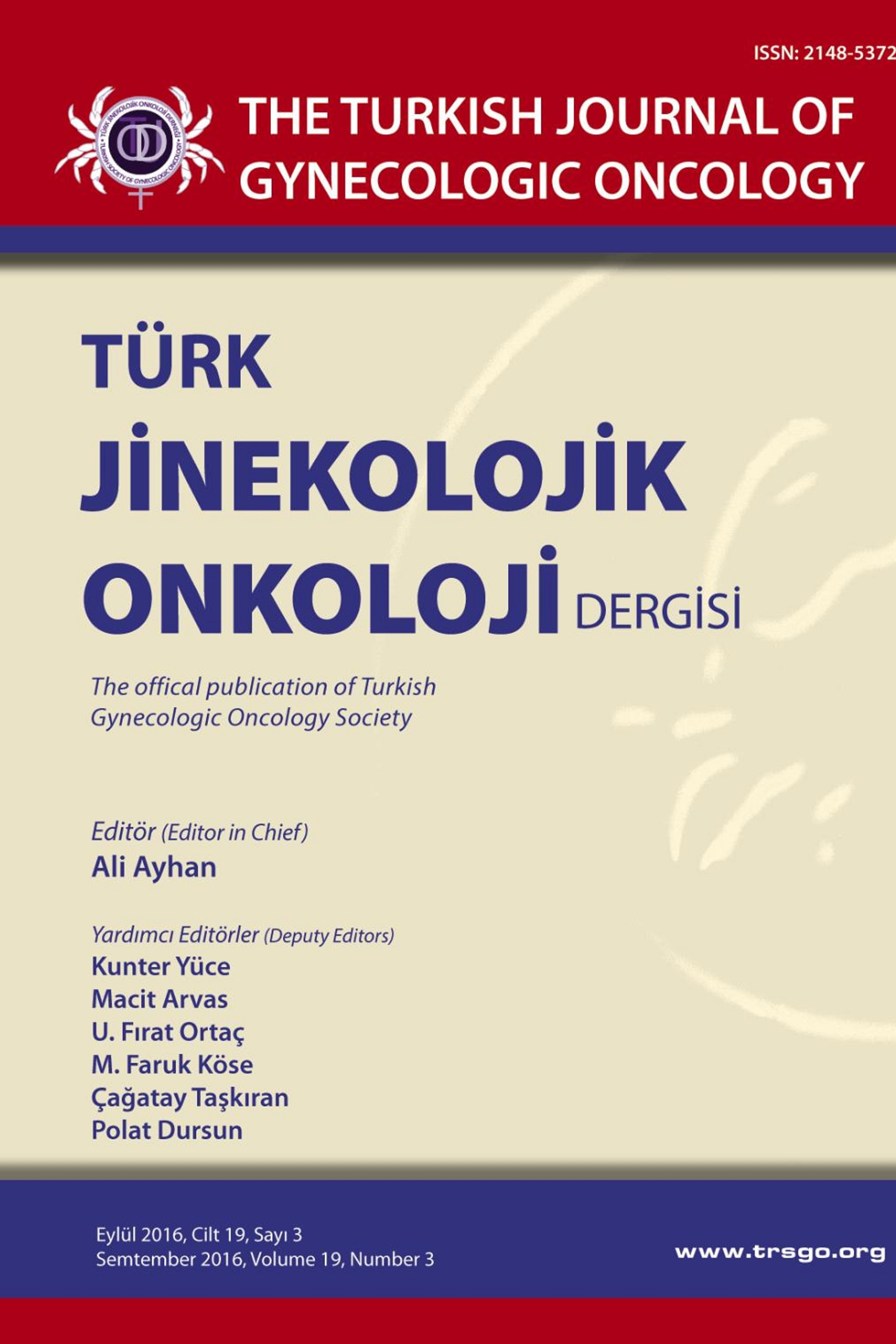Endometriyum Kanserinde Cerrahi Öncesi ve Sonrası Tümör Grade Uyuşmazlığı ve Klinik Yansıması
Endometrial cancer, Tumor, Grade, Discrepancy, Surgery
The Tumor Grade Discrepancy in Endometrial Cancer Before and its Clinical Reflection
___
- 1) Felix AS, Weissfeld JL, Stone RA, Bowser R, Chivukula M, Edwards RP, Linkov F. Factors associated with Type I and Type II endometrial cancer. Cancer Causes Control. 2010 Nov;21(11):1851-6.
- 2) Grimes DA.Diagnostic dilation and curettage: a reappraisal. Am J Obstet Gynecol. 1982 Jan 1;142(1):1-6.
- 3) Creasman WT, Morrow CP, Bundy BN, Homesley HD, Graham JE, Heller PB. Surgical pathologic spread patterns of endometrial cancer. A Gynecologic Oncology Group Study. Cancer. 1987 Oct 15;60(8 Suppl):2035-41.
- 4) Aalders JG, Thomas G. Endometrial cancer--revisiting the importance of pelvic and para aortic lymph nodes. Gynecol Oncol. 2007 Jan;104(1):222-31.
- 5) Case AS, Rocconi RP, Straughn JM Jr, Conner M, Novak L, Wang W, Huh WK. A prospective blinded evaluation of the accuracy of frozen section for the surgical management of endometrial cancer. Obstet Gynecol. 2006 Dec;108(6):1375-9.
- 6) Larson DM, Johnson KK, Broste SK, Krawisz BR, Kresl JJ. Comparison of D&C and office endometrial biopsy in predicting final histopathologic grade in endometrial cancer. Obstet Gynecol. 1995 Jul;86(1):38-42.
- 7) Soothill PW, Alcock CJ, MacKenzie IZ. Discrepancy between curettage and hysterectomy histology in patients with stage 1 uterine malignancy. Br J Obstet Gynaecol. 1989 Apr;96(4):478-81.
- 8) Leitao MM Jr, Kehoe S, Barakat RR, Alektiar K, Gattoc LP, Rabbitt C, Chi DS, Soslow RA, Abu-Rustum NR. Comparison of D&C and office endometrial biopsy accuracy in patients with FIGO grade 1 endometrial adenocarcinoma. Gynecol Oncol. 2009 Apr;113(1):105-8.
- 9) Helpman L, Kupets R, Covens A, Saad RS, Khalifa MA, Ismiil N, Ghorab Z, Dubé V, Nofech-Mozes S. Br J Cancer.Assessment of endometrial sampling as a predictor of final surgical pathology in endometrial cancer. 2014 Feb 4;110(3):609-15.
- 10) Göksedef BP, Akbayır O, Corbacıoğlu A, Güraslan H, Sencan F, Erol O, Cetin A. Comparison of preoperative endometrial biopsy grade and final pathologic diagnosis in patients with endometrioid endometrial cancer.Comparison of preoperative endometrial biopsy grade and final pathologic diagnosis in patients with endometrioid endometrial cancer. J Turk Ger Gynecol Assoc. 2012 Jun 1;13(2):106-10.
- 11) Benedet JL, Bender H, Jones H 3rd, Ngan HY, Pecorelli S. FIGO staging classifications and clinical practice guidelines in the management of gynecologic cancers. FIGO Committee on Gynecologic Oncology. Int J Gynaecol Obstet. 2000 Aug;70(2):209-62.
- 12) Keys HMKeys HM, Roberts JA, Brunetto VL, Zaino RJ, Spirtos NM, Bloss JD, Pearlman A, Maiman MA, Bell JG; Gynecologic Oncology Group. A phase III trial of surgery with or without adjunctive external pelvic radiation therapy in intermediate risk endometrial adenocarcinoma: a Gynecologic Oncology Group study. Gynecol Oncol. 2004 Mar;92(3):744-51.
- 13) Myers AP. New strategies in endometrial cancer: targeting the PI3K/mTOR pathway--the devil is in the details. Clin Cancer Res. 2013 Oct 1;19(19):5264-74.
- 14) Mackay HJ, Eisenhauer EA, Kamel-Reid S, Tsao M, Clarke B, Karakasis K, Werner HM, Trovik J, Akslen LA, Salvesen HB, Tu D, Oza AM. Molecular determinants of outcome with mammalian target of rapamycin inhibition in endometrial cancer. Cancer. 2014 Feb 15;120(4):603-10.
- 15) Dijkhuizen FP, Mol BW, Brölmann HA, Heintz AP. The accuracy of endometrial sampling in the diagnosis of patients with endometrial carcinoma and hyperplasia: a meta-analysis. Cancer. 2000 Oct 15;89(8):1765-72.
- 16) Mitchard J, Hirschowitz L Concordance of FIGO grade of endometrial adenocarcinomas in biopsy and hysterectomy specimens. Histopathology. 2003 Apr;42(4):372-8.
- 17) Mavromatis ID, Antonopoulos CN, Matsoukis IL, Frangos CC, Skalkidou A, Creatsas G, Petridou ET. Validity of intraoperative gross examination of myometrial invasion in patients with endometrial cancer: a meta-analysis. Acta Obstet Gynecol Scand. 2012 Jul;91(7):779-93.
- 18) Case AS, Rocconi RP, Straughn JM Jr, Conner M, Novak L, Wang W, Huh WK.A prospective blinded evaluation of the accuracy of frozen section for the surgical management of endometrial cancer. Obstet Gynecol. 2006 Dec;108(6):1375-9.
- 19) Fanning J, Tsukada Y, Piver MS.Intraoperative frozen section diagnosis of depth of myometrial invasion in endometrial adenocarcinoma. Gynecol Oncol. 1990 Apr;37(1):47-50.
- ISSN: 2148-5372
- Başlangıç: 2014
- Yayıncı: Türk Jinekolojik Onkoloji Derneği
Round Ligament's Cyst Passing Through Ingunal Canal
Aysun TEKELİ TAŞKÖMÜR, Osman Fadıl KARA
Kadın Sağlık Çalışanlarında Kanser Tarama Davranışları
Endometriyum Kanserinde Cerrahi Öncesi ve Sonrası Tümör Grade Uyuşmazlığı ve Klinik Yansıması
Emre ZAFER, Burcu BIÇAKCI, Tolga ATAKUL, Füruzan KAÇAR DÖGER, Merve CENGİZ, Hasan YÜKSEL
Endometrial Stromal Sarkomlara Güncel Yaklaşım
Varol GÜLSEREN, Mustafa KOCAER, Muzaffer SANCI, Kemal GÜNGÖRDÜK
